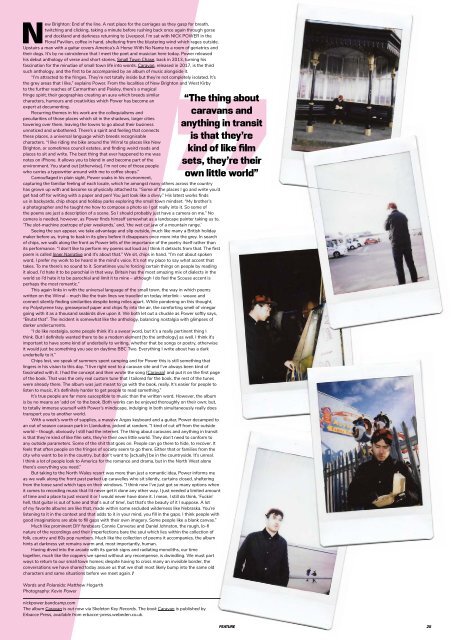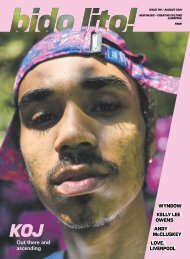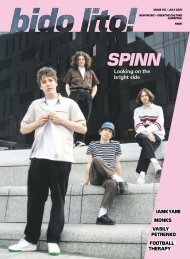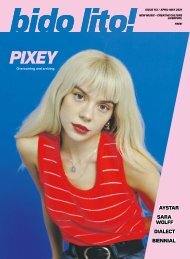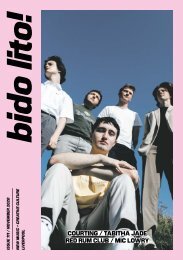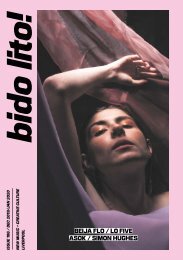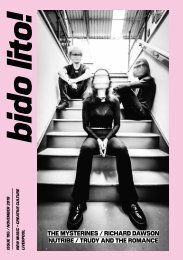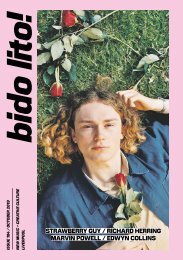Issue 84 / Dec 2017/Jan 2018
December 2017/January 2018 issue of Bido Lito! Featuring LO FIVE, TAYÁ, NICK POWER, MAC DEMARCO, LIVERPOOL MUSIC WEEK 2017 REVIEW and much more. Plus a special look at our need for space and independent venues, coinciding with a report into the health of Liverpool's music infrastructure.
December 2017/January 2018 issue of Bido Lito! Featuring LO FIVE, TAYÁ, NICK POWER, MAC DEMARCO, LIVERPOOL MUSIC WEEK 2017 REVIEW and much more. Plus a special look at our need for space and independent venues, coinciding with a report into the health of Liverpool's music infrastructure.
You also want an ePaper? Increase the reach of your titles
YUMPU automatically turns print PDFs into web optimized ePapers that Google loves.
New Brighton: End of the line. A rest place for the carriages as they gasp for breath,<br />
twitching and clicking, taking a minute before rushing back once again through gorse<br />
and dockland and darkness returning to Liverpool. I’m sat with NICK POWER in the<br />
Floral Pavilion, coffee in hand, sheltering from the blustering wind which rages outside.<br />
Upstairs a man with a guitar covers America’s A Horse With No Name to a room of geriatrics and<br />
their dogs. It’s by no coincidence that I meet the poet and musician here today. Power released<br />
his debut anthology of verse and short stories, Small Town Chase, back in 2013, turning his<br />
fascination for the minutiae of small town life into words. Caravan, released in <strong>2017</strong>, is the third<br />
such anthology, and the first to be accompanied by an album of music alongside it.<br />
“I’m attracted to the fringes. They’re not totally inside but they’re not completely isolated. It’s<br />
the grey areas that I like,” explains Power. From the localities of New Brighton and West Kirby<br />
to the further reaches of Carmarthen and Paisley, there’s a magical<br />
fringe spirit; their geographies creating an aura which breeds similar<br />
characters, humours and creativities which Power has become an<br />
expert at documenting.<br />
Recurring themes in his work are the colloquialisms and<br />
peculiarities of those places which sit in the shadows, larger cities<br />
towering over them, leaving the towns to go about their business<br />
unnoticed and unbothered. There’s a spirit and feeling that connects<br />
these places, a universal language which breeds recognisable<br />
characters. “I like riding me bike around the Wirral to places like New<br />
Brighton, or sometimes council estates, and finding weird roads and<br />
places to sit and write. The best thing that ever happened to me was<br />
notes on iPhone. It allows you to blend in and become part of the<br />
environment. You stand out [otherwise]. I’m not one of those people<br />
who carries a typewriter around with me to coffee shops.”<br />
Camouflaged in plain sight, Power soaks in his environment,<br />
capturing the familiar feeling of each locale, which he amongst many others across the country<br />
has grown up with and become so physically attached to. “Some of the places I go and write you’d<br />
get had off for writing with a paper and pen! You just look like a divvy.” His latest works finds<br />
us in backyards, chip shops and holiday parks exploring the small town mindset. “My brother’s<br />
a photographer and he taught me how to compose a photo so I got really into it. So some of<br />
the poems are just a description of a scene. So I should probably just have a camera on me.” No<br />
camera is needed, however, as Power finds himself somewhat as a landscape painter taking us to,<br />
‘The slot-machine zoetrope of pier weekends,’ and, ‘the wet cut jaw of a mountain range.’<br />
Seeing the sun appear, we take advantage and slip outside, much like many a British holiday<br />
maker before us, trying to bask in its glory before it disappears once more into the grey. In search<br />
of chips, we walk along the front as Power tells of the importance of the poetry itself rather than<br />
its performance. “I don’t like to perform my poems out loud as I think it detracts from that. The first<br />
poem is called Inner Narrative and it’s about that.” We sit, chips in hand. “I’m not about spoken<br />
word, I prefer my work to be heard in the mind’s voice. It’s not my place to say what accent that<br />
takes. To me there’s no sound to it. Sometimes you’re forcing certain things on people by reading<br />
it aloud. I’d hate it to be parochial in that way. Britain has the most amazing mix of dialects in the<br />
world so I’d hate it to be parochial and limit it to mine – although I do feel the Scouse accent is<br />
perhaps the most romantic.”<br />
This again links in with the universal language of the small town, the way in which poems<br />
written on the Wirral – much like the train lines we travelled on today interlink – weave and<br />
connect silently finding similarities despite being miles apart. While pondering on this thought,<br />
my Polystyrene tray, greaseproof paper and chips fly into the air, the comforting smell of vinegar<br />
going with it as a thousand seabirds dive upon it. We both let out a chuckle as Power softly says,<br />
“Brutal that”. The incident is somewhat like the anthology, balancing nostalgia with glimpses of<br />
darker undercurrents.<br />
“I do like nostalgia, some people think it’s a swear word, but it’s a really pertinent thing I<br />
think. But I definitely wanted there to be a modern element [to the anthology] as well. I think it’s<br />
important to have some kind of underbelly to writing, whether that be songs or poetry, otherwise<br />
it would just be something you see on daytime BBC Two. Everything I write about has a dark<br />
underbelly to it.”<br />
Chips lost, we speak of summers spent camping and for Power this is still something that<br />
lingers in his vision to this day. “I live right next to a caravan site and I’ve always been kind of<br />
fascinated with it. I had the concept and then wrote the song [Caravan] and put it on the first page<br />
of the book. That was the only real custom tune that I tailored for the book, the rest of the tunes<br />
were already there. The album was just meant to go with the book, really. It’s easier for people to<br />
listen to music, it’s definitely harder to get people to read something.”<br />
It’s true people are far more susceptible to music than the written word. However, the album<br />
is by no means an ‘add on’ to the book. Both works can be enjoyed thoroughly on their own; but,<br />
to totally immerse yourself with Power’s mindscape, indulging in both simultaneously really does<br />
transport you to another world.<br />
With a week’s worth of supplies, a massive Argos keyboard and a guitar, Power decamped to<br />
an out of season caravan park in Llandudno, picked at random. “I kind of cut off from the outside<br />
world – though, obviously I still had the internet. The thing about caravans and anything in transit<br />
is that they’re kind of like film sets, they’re their own little world. They don’t need to conform to<br />
any outside parameters. Some of the shit that goes on. People can go there to hide, to recover. It<br />
feels that often people on the fringes of society seem to go there. Either that or families from the<br />
city who want to be in the country, but don’t want to [actually] be in the countryside. It’s unreal.<br />
I think a lot of people look to America for the romance and drama, but in the North West alone<br />
there’s everything you need.”<br />
But taking to the North Wales resort was more than just a romantic idea, Power informs me<br />
as we walk along the front past parked up caravelles who sit silently, curtains closed, sheltering<br />
from the loose sand which taps on their windows. “I think now I’ve just got so many options when<br />
it comes to recording music that I’d never get it done any other way. I just needed a limited amount<br />
of time and a place to just record it or I would never have done it. I mean, I still do think, ‘Fuckin’<br />
hell, that guitar is out of tune and that’s out of time’, but that’s the beauty of it I suppose. A lot<br />
of my favorite albums are like that, made within some secluded wilderness like Nebraska. You’re<br />
listening to it in the context and that adds to it in your mind, you fill in the gaps. I think people with<br />
good imaginations are able to fill gaps with their own imagery. Some people like a blank canvas.”<br />
Much like prominent DIY forebears Connie Converse and Daniel Johnston, the rough, lo-fi<br />
nature of the recordings and their imperfections bare the soul which lies within the collection of<br />
folk, country and 60s pop numbers. Much like the collection of poems it accompanies, the album<br />
hints at darkness yet remains warm and, most importantly, human.<br />
Having dived into the arcade with its garish signs and radiating monoliths, our time<br />
together, much like the coppers we spend without any recompense, is dwindling. We must part<br />
ways to return to our small town homes; despite having to cross many an invisible border, the<br />
conversations we have shared today assure us that we shall most likely bump into the same old<br />
characters and same situations before we meet again. !<br />
Words and Polaroids: Matthew Hogarth<br />
Photography: Kevin Power<br />
nickpower.bandcamp.com<br />
The album Caravan is out now via Skeleton Key Records. The book Caravan is published by<br />
Erbacce Press, available from erbacce-press.webeden.co.uk.<br />
“The thing about<br />
caravans and<br />
anything in transit<br />
is that they’re<br />
kind of like film<br />
sets, they’re their<br />
own little world”<br />
FEATURE<br />
25


